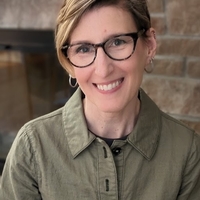
Erin J. Rand
Erin J. Rand is an Associate Professor of Communication and Rhetorical Studies and is affiliated with LGBTQ Studies and Women's and Gender Studies at Syracuse University. She earned her PhD from the University of Iowa in 2006. Her research focuses on the rhetoric of activism and social movements, especially queer and feminist activism. Rooted in contemporary rhetorical theory and criticism, her work also draws upon critical theory, cultural studies, and queer and feminist theories, with an eye both to understanding the rhetorics of social change and rethinking (or queering) the rhetorical tradition.
Rand's essays have appeared in Quarterly Journal of Speech, Communication and Critical/Cultural Studies, Text and Performance Quarterly, Women's Studies in Communication, Rhetoric and Public Affairs, QED: A Journal of GLBTQ World Making, Western Journal of Communication, and Journal of Communication Inquiry. Rand's books include Minor Troubles: Racial Figurations of Youth Sexuality and Childhood's Queerness (Ohio State University Press, 2025) and Reclaiming Queer: Activist and Academic Rhetorics of Resistance (University of Alabama Press, 2014).
Rand's essays have appeared in Quarterly Journal of Speech, Communication and Critical/Cultural Studies, Text and Performance Quarterly, Women's Studies in Communication, Rhetoric and Public Affairs, QED: A Journal of GLBTQ World Making, Western Journal of Communication, and Journal of Communication Inquiry. Rand's books include Minor Troubles: Racial Figurations of Youth Sexuality and Childhood's Queerness (Ohio State University Press, 2025) and Reclaiming Queer: Activist and Academic Rhetorics of Resistance (University of Alabama Press, 2014).
less
InterestsView All (8)
Uploads
Books by Erin J. Rand
Papers by Erin J. Rand
The RSA 15:
Suzanne Berg, Newman University
Betsy Brunner, University of Utah
Josue David Cisneros, University of Illinois
Doug Cloud, Colorado State University
Michael Eisenstadt, University of Kansas
Kelly Jakes, Wayne State University
Michelle Kearl, IUPU-FW
Dominic Manthey, Pennsylvania State University
Jade Olson, University of Maryland
Milene Ortega, Georgia State University
Erin J. Rand, Syracuse University
Alyssa Samek, California State University Fullerton
Jessica Shumake, University of Arizona
Ian Summers, University of Utah
Justine Wells, University of South Carolina
To cite this paper in APA: RSA 15 (2016). Whither Social Movement in Rhetorical Studies? A White Paper. Presented at the Rhetoric Society of America conference, Atlanta, GA, May 26-29, 2016. For inquiries, please contact Christina Foust (cfoust@du.edu)
Though we can read “social movement” into the record of rhetorical studies, participants raised a number of questions: What is at stake in the loss of “social movement” in rhetorical studies? For rhetorical critics who see the value of “social movement” (in interdisciplinary connections and public relevance, for instance), what must be done to rehabilitate the term? More particularly, what is the relationship between social movement as a phenomenon, noun, or “thing” and others’ treatments of social movement as a verb, process, or indicative of meaning change? How might reclaiming “social movement” for rhetorical studies invigorate work across different disciplinary domains, and the public? This white paper is the product of conversations provoked by these questions.
The RSA 15:
Suzanne Berg, Newman University
Betsy Brunner, University of Utah
Josue David Cisneros, University of Illinois
Doug Cloud, Colorado State University
Michael Eisenstadt, University of Kansas
Kelly Jakes, Wayne State University
Michelle Kearl, IUPU-FW
Dominic Manthey, Pennsylvania State University
Jade Olson, University of Maryland
Milene Ortega, Georgia State University
Erin J. Rand, Syracuse University
Alyssa Samek, California State University Fullerton
Jessica Shumake, University of Arizona
Ian Summers, University of Utah
Justine Wells, University of South Carolina
To cite this paper in APA: RSA 15 (2016). Whither Social Movement in Rhetorical Studies? A White Paper. Presented at the Rhetoric Society of America conference, Atlanta, GA, May 26-29, 2016. For inquiries, please contact Christina Foust (cfoust@du.edu)
Though we can read “social movement” into the record of rhetorical studies, participants raised a number of questions: What is at stake in the loss of “social movement” in rhetorical studies? For rhetorical critics who see the value of “social movement” (in interdisciplinary connections and public relevance, for instance), what must be done to rehabilitate the term? More particularly, what is the relationship between social movement as a phenomenon, noun, or “thing” and others’ treatments of social movement as a verb, process, or indicative of meaning change? How might reclaiming “social movement” for rhetorical studies invigorate work across different disciplinary domains, and the public? This white paper is the product of conversations provoked by these questions.